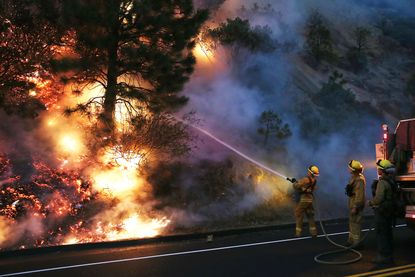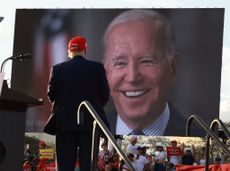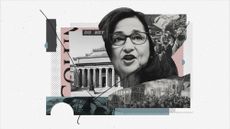Americans are finally taking climate change seriously. Here is why that might not last.
Polling shows that voters' commitment to combating global warming is very much conditional


A big new poll has raised some optimism that public opinion on climate change is finally catching up to the science. But the poll is a welcome reflection that more and more people understand the seriousness of the climate threat, some caution is merited — for two important reasons.
Among the adults polled by The New York Times, Stanford University, and Resources for the Future in January, a healthy majority — 78 percent — think global warming will be a serious problem for the United States (44 percent very serious; 34 percent somewhat serious). Even among Tea Party supporters, 59 percent put themselves in one of the "serious" camps.
As the poll breakdown shows, even though people more clearly recognize that climate change will be a problem, they still consider the threat something that will happen to "other" people, either those living in foreign countries or future generations. When asked if climate change will hurt them personally, more people are likely to say "a little" or "not at all" than "a great deal" or "a lot."
Subscribe to The Week
Escape your echo chamber. Get the facts behind the news, plus analysis from multiple perspectives.

Sign up for The Week's Free Newsletters
From our morning news briefing to a weekly Good News Newsletter, get the best of The Week delivered directly to your inbox.
From our morning news briefing to a weekly Good News Newsletter, get the best of The Week delivered directly to your inbox.
This persistent view that the worst effects are far into the future is not necessarily inaccurate. As reports from the Intergovernmental Panel on Climate Change and World Bank indicate, even at current rates, the worst effects manifest themselves at temperature levels that we will only begin reaching at midcentury, even under a business-as-usual (no policy changes) scenario.
However, because the effects of climate change are cumulative, and the transitions needed to prevent the worst effects involve large-scale changes to our economy, it is precisely now that action is needed. And even if the worst effects are still a generation away, there are still many effects that we are seeing right now.
The Risky Business Project, co-chaired by Michael Bloomberg, Henry Paulson, and Tom Steyer, is dedicated to demonstrating that while climate change is having immediate economic effects, for business as well as nations, time is still on our side. Doing something now, they argue, would be more effective and less expensive than doing something later, as investments and policy changes made today will pay much bigger dividends than waiting to play catch-up.
That the public is still slow to realize this underscores the flaws in how the risks and benefits are being communicated.
Sign up for Today's Best Articles in your inbox
A free daily email with the biggest news stories of the day – and the best features from TheWeek.com
Which brings us to the next problem: how to go about doing what is necessary. This challenge is entirely separate from convincing folks climate change is a threat, and the results are less than encouraging.
An overwhelming number of respondents (80 percent) think the government should give tax breaks to companies that use more renewable energy. (To put this in perspective, a modified version of this idea is one of the two main components of Australian Prime Minister Tony Abbott's climate change plan — which is much maligned.) Nearly as many (78 percent) would support a federally mandated limit on greenhouse gas emissions, which is the closest analog to the Obama administration's Clean Power Plan.
Unfortunately, far fewer people said that they would tolerate an increase to their electric bills, or an increase to the gas tax to discourage emissions from transportation (a large slice of the American greenhouse gas footprint). This suggests that public tolerance for policies on climate change are household cost sensitive in a way that is not true for policies that are perceived to affect individual companies.
This is disappointing, for two reasons. The first is that improving energy efficiency is an important factor in whether the United States can truly reduce emissions over time. But the fight on efficiency cannot be won if it is all carrot and no stick. Higher gas taxes discourage fuel consumption and encourage important changes in the American vehicle fleet (fewer sport-utility vehicles, more subcompacts and hybrids).
The second reason is that approval on climate change policies may be related to perception of overall economic well-being in a way that is not conducive to long-term policy planning.
Consider past polling on the seriousness of climate change before and after the 2008 financial crisis. According to the Pew Research Center, the percentage of people who saw climate change as a "very serious" problem polled in the low-40 percent range between 2006 and 2008. By October 2009, however, that number had plummeted 10 percentage points, as concerns over the beginning of a recession took hold in the public imagination. While people were still thinking of climate change as a threat, fears about general economic well-being took precedence.
Will the American people similarly lose any appetite for aggressive climate action in the face of the next crisis? The numbers in this most recent poll are enough to give one cause for concern.
Create an account with the same email registered to your subscription to unlock access.
Neil Bhatiya is a Policy Associate at The Century Foundation, where he works on issues related to U.S. foreign policy, with a specific focus on South Asia and climate change.
-
 'Voters know Biden and Trump all too well'
'Voters know Biden and Trump all too well'Instant Opinion Opinion, comment and editorials of the day
By Harold Maass, The Week US Published
-
 Is the Gaza war tearing US university campuses apart?
Is the Gaza war tearing US university campuses apart?Today's Big Question Protests at Columbia University, other institutions, pit free speech against student safety
By Joel Mathis, The Week US Published
-
 DOJ settles with Nassar victims for $138M
DOJ settles with Nassar victims for $138MSpeed Read The settlement includes 139 sexual abuse victims of the former USA Gymnastics doctor
By Justin Klawans, The Week US Published